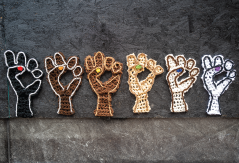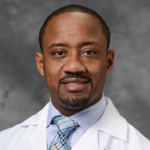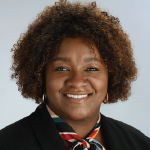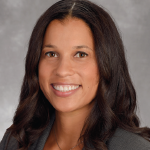
© Rhymeandreason / shutterstock.com
Physician Ed. Note: What follows are the words and stories of my friends and colleagues. They are also your friends and colleagues. And if you don’t know them personally, I’m sure you know and respect someone else who can share similar experiences. They are stories of pain, of being wronged, and of an unjust society and world. They are words that bring tears to the eyes and an ache to the soul. Our authors are a shining example of determination, resilience, and grit—all qualities that I admire the most in my idols. Please read, reflect on your own life, and act purposely to be an ally. Black Lives Matter. —Alexander Chiu, MD
Do Away with Fear
 Lamont Jones, MD, MBA
Lamont Jones, MD, MBA
“You must never be fearful about what you are doing when it is right. I have learned over the years that when one’s mind is made up, this diminishes fear; knowing what must be done does away with fear.”
—Rosa Parks
On Nov. 29, 1997, in Metairie, La., I was arrested and charged with assault and battery of a police officer, resisting arrest, and disturbing the peace. I was young, black, and male—all the ingredients necessary for many to assume it a forgone conclusion.
The truth of the matter was the charges were 100% fabricated. The police were called to a gathering I was at, and the officer did not like that I questioned why he was there. He threatened to push my head through the windshield of his car before he handcuffed me and took me to jail. When I was released the next day, his written report said I had struck him several times, while I screamed that I didn’t want to leave my music. Despite having multiple witnesses (more than 10 current black doctors, lawyers, dentists, and executives) and the entire event on video, the complaint I filed against the officer was dismissed due to insufficient evidence and I had to seek legal help to fight the charges.
That day, the officer did not see a young, Black male from Detroit with zero blemishes on his record, an honors premedical student at Xavier University of Louisiana who had been accepted by and would be matriculating to the top-10-ranked University of Michigan School of Medicine in six months, a future physician scientist and leader, a future husband and father, a brother, a son, an NIH grant recipient, a mentor, a role model, and someone who would volunteer medical services in his local community and travel the world to provide care to those in need. He had to know his premeditated actions that day would have a negative effect on my life.
Maybe he thought it would be buried under a list of past transgressions. He obviously didn’t know (or would not have cared to know) that a felony charge would have prohibited me from becoming a physician, something that I had earned with my blood, sweat, and tears. Nevertheless, with God’s grace and family support, and aided by Xavier University administration, unlike many others I was able to successfully clear my name while focusing on my first year of medical school. I offer my story as another example of how in eight minutes and 46 seconds a life, or a life’s work, can be stolen.
Until this point, I haven’t told this story to many people. But in times like these and in the midst of discussions of current events, when colleagues and friends have doubt or question how one’s life or life’s work could be in danger not because of one’s own actions or character but solely because of the color of one’s skin, I offer my story so they can put a familiar face on the current situation that our country faces.
I felt compelled to write the account of my experience not for sympathy but to inspire empathy for the spark and subsequent fire that the murder of George Floyd has ignited inside so many people. I’ve had other such experiences in the past, but this one was more significant because I was so close to accomplishing my dream of becoming a physician. When I look back it hurts to know that it could have all come to an end at that very moment.
The unfortunate truth is my experience is very common. I’m happy that my story has inspired others to have the courage to tell theirs. To add insult to injury, while I was in my first year of medical school, waiting for a resolution, I had medical school classmates who openly and privately voiced that I and the other 10 African American students didn’t deserve to be there. These experiences of racism have made me more determined to succeed and to assist others. However, I would be remiss if I didn’t say that those opinions were the minority and did not represent the totality of my experience.
I think there are three relatively simple steps that we must take to address racism: 1. Acknowledge that racism exists; 2. Understand the bias in our processes; and 3. Act with purpose to include diverse representation at all organizational levels. There’s a letter from my attorney, telling me that I had been cleared of the charges, that hangs on the wall in my office alongside the many certificates and awards that I’ve received over the years. It serves as a reminder that only God can stop me now. It’s time to stand for justice (I encourage you to follow #StandForJustice, #BlackLivesMatter, and #JusticeforGeorgeFloyd on Twitter) and do away with fear, because fear leads to inaction. Now is the time for honest dialogue and purposeful action.
Hear My Voice
 Carrie L. Francis, MD, assistant dean, student affairs, and associate professor in the department of otolaryngology–head and neck surgery, Kansas University Medical Center, Kansas City, Kan.
Carrie L. Francis, MD, assistant dean, student affairs, and associate professor in the department of otolaryngology–head and neck surgery, Kansas University Medical Center, Kansas City, Kan.
My story begins with a family that never really spoke about race—instead, we spoke about racism. My recent ancestry included domestic workers and teachers, laborers and salesmen who were able to experience class mobility and gain small increments of wealth in spite of the racism and oppression they encountered daily. Racism, as defined by Dr. Camara P. Jones, is a “system of structuring opportunity and assigning value based on the social interpretation of how one looks.” This system unfairly disadvantages some people and communities and unfairly advantages others (American Medical Association. “Prioritizing Equity: The Root Cause.” May 28, 2020. https://youtu.be/E5-5W-64Jeo). My parents were vigilant in their determination to help my brother and me understand this concept and protect us from it. They taught us to recognize racism and how to navigate our environments. We were told to evaluate others’ actions to fortify those who came after us. This served me well, and I thought I was prepared for the world of medicine.
Much changed along the journey. During medical school, race—but not racism—was discussed as the basis for disease, pathologizing my existence. There was the email, colored with racial epithets, from a student who referred to Black veterans seeking VA care as a hospital “infestation.” And I’ll never forget the surgeon who attempted to dissuade me from pursuing a surgical specialty because it would prevent me from finding a suitable “Black” mate and having a “Black” family. I remember him ending the conversation with a resigned shrug, noting that alternatives were no better since female residents’ marriages rarely survived residency anyway.
How could these experiences not impact my identity and my health? How could such actions fail to inform the future practice of my non-Black peers? Even now, examples of explicit and implicit racial bias (coded to avoid the term racism) occur far too often. Donning the white coat, scrubs, and badge has never been protective. Sitting in faculty spaces, I have been asked to collect and remove garbage. “Doctor” is often the last thing people think when they see me.
I could share more; instead, I urge you to follow Twitter’s #BlackInTheIvory, co-founded by Dr. Shardé Davis and PhD student Joy Woods. The hashtag is both a revealing and devastating glimpse of the full experience of Black trainees and academics in higher education. Among the complexity of these stories is the juxtaposition of support found in knowing that you aren’t alone and the recognition that sharing your experiences isn’t always safe. Challenging interpersonal racism can impact your reputation, job prospects, letters of recommendation, or match. Combating structural racism can come with consequence or intentional nothingness. This doesn’t even begin to address the intersection of gender and other identities.
Complicated, right?
At some point along this journey I made the choice to speak softly. Self-preservation required that I get to the finish line and avoid as many hurdles as possible. Yet, with each success, the line seemed to move farther way. Sometimes I find myself alone in the infinite and often unpaid and undervalued work of equity and inclusion. I remind myself that helping transform the narrative of race-based medicine in clinical practice is an issue bigger than me. I coach and mentor students and trainees traditionally underrepresented in medicine. I advocate for change. Pushing through my own experiences of implicit and explicit racism, I resist the impulse to surrender. A sense of urgency keeps me moving forward. My persistent presence in academic medicine is activism. I am proud of being a physician leader practicing anti-racism and working toward social justice.
Discussing these concepts is often framed as “difficult.” Recently, I was moved by Dr. Rebekah Fenton, who questioned that narrative when she noted that “Calling our [Black Americans] life experiences difficult implies that treating us as humans is overwhelming or burdensome” (@RFentonMD (Dr. Rebekah Fenton) 1846, 6/5/2020). https://twitter.com/rfentonmd/status/1269052938296557568?2=21). In the midst of a pandemic that lays bare structural racism that disproportionately impacts minority communities, compounded by repeated episodes of police violence that devalue and end Black lives, describing these conversations as “difficult” is distressing. This framing centers the feelings of non-Black colleagues, and I’m left wondering how to walk a fine line between my value and their discomfort.
Interrogating this narrative has transformed my relationship with my true voice. I am exhausted, but I’m also compelled to speak loudly. We have taken an oath to heal—racism is a public health issue, the use of race-based medicine in medical education causes harm, and physicians are activists. Just as we would interrogate, study, and act upon any other disease that causes death and injury, we must also address racism (American Medical Association. “Prioritizing Equity: Police Brutality and COVID-19.” June 4, 2020.).
We all benefit when everyone is valued. Let us evaluate our polices, structures, practices, values, and norms. Let us acknowledge previous harm from inequity. Let us scrutinize how power, resources, and opportunities are allocated. To achieve health equity, we must invest in and empower our minoritized patients and communities. To achieve equity and inclusivity in our workspaces, we must listen to, invest in, and empower Black healthcare professionals. We must create a space for meaningful dialogue that discusses race as a social construct with assigned value that allows racism to persist. The conversations must be ongoing—not only during times of righteous protest. We must develop meaningful, transparent goals and actions in collaboration with minority patients, students, and health professionals. Finally, we must acknowledge that anti-racism is a process rather than an outcome. We must unlearn current structures based on old knowledge and learn hard new truths. Mistakes will be made. But if we’re to embody the change we want to see, we must be open to critique in order to reflect and change course for the better.
I am Black. I am a woman. I am a mentor, coach, and advocate. I am an otolaryngologist–head and neck surgeon. I am a physician activist. I am no longer quietly working toward equity. Hear my voice: Black Lives Matter.
Recognize Biases
 Erynne A. Faucett, MD, pediatric otolaryngologist, Phoenix Children’s Hospital, assistant professor of otolaryngology, Mayo Clinic College of Medicine and Science, assistant professor of otolaryngology, University of Arizona College of Medicine Department of Child Health, Phoenix
Erynne A. Faucett, MD, pediatric otolaryngologist, Phoenix Children’s Hospital, assistant professor of otolaryngology, Mayo Clinic College of Medicine and Science, assistant professor of otolaryngology, University of Arizona College of Medicine Department of Child Health, Phoenix
As an African American, I have experienced racism and discrimination throughout my life. In elementary school, I was told that I was a “good kind of Black” because my skin color was lighter and my hair less “kinky” than other Black people’s. Though people thought this was a compliment, these ignorant statements stung me at a young age, as my parents taught my sister and me about our family history and to be proud of our African American roots. We had pictures and stories from our great-great-great grandmother, a slave, who was also a mistress of her slave master. I would continue to hear these “compliments” throughout my childhood and into adulthood. When I was in the fourth grade, my sister and I were called the n-word by a classmate for the first time. Those around us giggled. This made me upset, so I made a comment about her red hair (the meanest thing I could think of). My parents were called to talk to the principal, but hers were not. That’s the day my dad sat my sister and me down to talk about racism. He told us that we would have to be twice as good to get half as much respect.
Little did we know that it wouldn’t be the last time we were called that word. Many years on the basketball court resulted in more derogatory name calling and being spit on by opponents and those in the stands (sometimes even by adults). As we got older, my parents taught us how to interact with police officers and authorities: Be respectful, answer all questions concisely, and show your hands at all times. The day after prom, my friends and our dates decided to go to the local Six Flags amusement park. We drove the nice convertibles our dates had rented for prom to the park. Upon entry into the parking lot, we were stopped by multiple police officers and had our cars and personal belongings searched because we “matched the identities of a group of people who stole a car in the city.” Only a couple of months afterward, I had a knee put to my back by a police officer after another case of misidentification while at a graduation party. These events all happened before the age of 18.
Unfortunately, incidents like these continued through college, medical school, and my professional life. In medical school, I had a patient refuse a physical examination by a “negro student.” I’ve been asked if I got into medical school because of affirmative action. I’ve had peers ask me why I “don’t talk like I’m Black.” Although I recognized the discrimination in these incidents, I never responded or spoke my mind because I didn’t want to make a scene, and I was nervous about it preventing me from advancing in my medical career.
When I think about how respect for all can be accomplished, there are some things to consider. People might think that racism affects only a particular socioeconomic group or class, but this isn’t the case. I think it’s important for individuals to recognize their implicit racial bias, meaning the mental process that stimulates negative attitudes about people who aren’t members of one’s own racial group. Minimizing implicit bias may be difficult, but the first step is recognizing it. Trying to challenge current negative biases about specific racial groups with contrary or positive information that goes against negative stereotypes is useful. Engaging in open dialogue with others about one’s biases can also be helpful. Limiting bias not only can help with interactions with peers but can also improve relationships with patients by recognizing how one’s biases can influence those interactions.
Being an ally also helps. Ideally, individuals would speak up when they witness racism or discrimination of any form. People who hold positions of privilege or leadership need to be more active allies to those with less access and to take responsibility to advocate for changes that will help others be successful. In our specialty, there’s a need to continue to increase the presence of minorities in leadership positions, as moderators on panels, and at scientific presentations. Recruitment at an early age to the field is crucial. Being a part of the solution, not the problem, starts with understanding and working on ourselves, recognizing our biases, and actively being an ally.